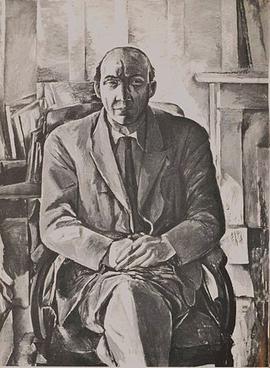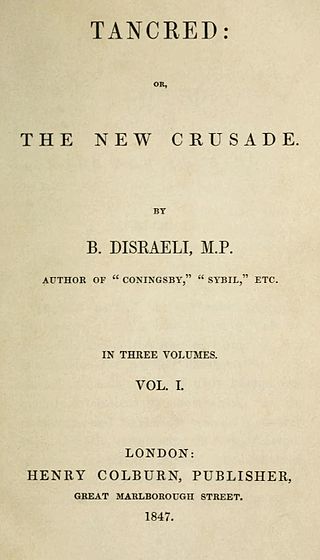
Evan Harrington is an 1861 novel by George Meredith, a glowing comedy of Victorian presumptions.

Evan Harrington is an 1861 novel by George Meredith, a glowing comedy of Victorian presumptions.
The second of Meredith's 'mainstream' novels, the work is loosely autobiographical in inspiration; [1] and concerns the social climbing family (three married daughters; one unmarried son) of the recently deceased tailor, Melchisedec (The Great Mel) Harrington. [2]
Two of Meredith's most notable comic creations - The Great Mel and his daughter Louisa, the scheming Countess of Saldar - appear in the book. [3] Among lesser comic figures are Jack Raikes and Mr Parsley. [4]
The love interest of the hero, Evan - who is urged up the social ladder by his three sisters - is Rose Jocelyn: [5] she was taken as the epitome of mid-Victorian womanhood by the scholar Henry Sidgwick. [6]
The Bloomsbury Group—or Bloomsbury Set—was a group of associated English writers, intellectuals, philosophers and artists in the first half of the 20th century, including Virginia Woolf, John Maynard Keynes, E. M. Forster, Vanessa Bell, and Lytton Strachey. This loose collective of friends and relatives was closely associated with the University of Cambridge for the men and King's College London for the women, and they lived, worked or studied together near Bloomsbury, London. According to Ian Ousby, "although its members denied being a group in any formal sense, they were united by an abiding belief in the importance of the arts." Their works and outlook deeply influenced literature, aesthetics, criticism, and economics as well as modern attitudes towards feminism, pacifism, and sexuality.

The English novel is an important part of English literature. This article mainly concerns novels, written in English, by novelists who were born or have spent a significant part of their lives in England, Scotland, Wales, or Northern Ireland. However, given the nature of the subject, this guideline has been applied with common sense, and reference is made to novels in other languages or novelists who are not primarily British, where appropriate.

William Allingham was an Irish poet, diarist and editor. He wrote several volumes of lyric verse, and his poem "The Faeries" was much anthologised. But he is better known for his posthumously published Diary, in which he records his lively encounters with Tennyson, Carlyle and other writers and artists. His wife, Helen Allingham, was a well-known watercolourist and illustrator.

George Meredith was an English novelist and poet of the Victorian era. At first, his focus was poetry, influenced by John Keats among others, but Meredith gradually established a reputation as a novelist. The Ordeal of Richard Feverel (1859) briefly scandalised Victorian literary circles. Of his later novels, the most enduring is The Egoist (1879), though in his lifetime his greatest success was Diana of the Crossways (1885). His novels were innovative in their attention to characters' psychology, and also portrayed social change. His style, in both poetry and prose, was noted for its syntactic complexity; Oscar Wilde likened it to "chaos illumined by brilliant flashes of lightning". Meredith was an encourager of other novelists, as well as an influence on them; among those to benefit were Robert Louis Stevenson and George Gissing. Meredith was nominated for the Nobel Prize in Literature seven times.
British literature is literature from the United Kingdom of Great Britain and Northern Ireland, the Isle of Man, and the Channel Islands. This article covers British literature in the English language. Anglo-Saxon literature is included, and there is some discussion of Latin and Anglo-Norman literature, where literature in these languages relate to the early development of the English language and literature. There is also some brief discussion of major figures who wrote in Scots, but the main discussion is in the various Scottish literature articles.
William Habington was an English poet.

George Granville Barker was an English poet, identified with the New Apocalyptics movement, which reacted against 1930s realism with mythical and surrealistic themes. His long liaison with Elizabeth Smart was the subject of her cult-novel By Grand Central Station I Sat Down and Wept.

Marie Adelaide Elizabeth Rayner Lowndes, who wrote as Marie Belloc Lowndes, was a prolific English novelist, and sister of author Hilaire Belloc.
The New Apocalyptics were a poetry grouping in the United Kingdom in the 1940s, taking their name from the anthology The New Apocalypse (1939), which was edited by J. F. Hendry (1912–1986) and Henry Treece. There followed the further anthologies The White Horseman (1941) and The Crown and Sickle (1944).
The Scottish Renaissance was a mainly literary movement of the early to mid-20th century that can be seen as the Scottish version of modernism. It is sometimes referred to as the Scottish literary renaissance, although its influence went beyond literature into music, visual arts, and politics. The writers and artists of the Scottish Renaissance displayed a profound interest in both modern philosophy and technology, as well as incorporating folk influences, and a strong concern for the fate of Scotland's declining languages.
Sentimentality originally indicated the reliance on feelings as a guide to truth, but in current usage the term commonly connotes a reliance on shallow, uncomplicated emotions at the expense of reason.
The sensation novel, also sensation fiction, was a literary genre of fiction that achieved peak popularity in Great Britain in the 1860s and 1870s, centering taboo material shocking to its readers as a means of musing on contemporary social anxieties.
David Daiches was a Scottish literary historian and literary critic, scholar and writer. He wrote extensively on English literature, Scottish literature and Scottish culture.

The Kailyard school is a proposed literary movement of Scottish fiction; kailyard works were published and were most popular roughly from 1880–1914. The term originated from literary critics who mostly disparaged the works said to be within the school; it was not a term of self-identification used by authors alleged to be within it. According to these critics, kailyard literature depicted an idealised version of rural Scottish life, and was typically unchallenging and sentimental.
Handlyng Synne by Robert Manning of Brunne is a Middle English verse devotional work, intended for the use of both learned and unlearned men, dealing with the theory and practice of morality, and illustrating this doctrine with stories drawn from ordinary life. It was begun in the year 1303. It is valued today for its simple and entertaining style, and for the light it throws on English life in the Middle Ages.

English literature is literature written in the English language from the English-speaking world. The English language has developed over the course of more than 1,400 years. The earliest forms of English, a set of Anglo-Frisian dialects brought to Great Britain by Anglo-Saxon invaders in the fifth century, are called Old English. Beowulf is the most famous work in Old English, and has achieved national epic status in England, despite being set in Scandinavia. However, following the Norman conquest of England in 1066, the written form of the Anglo-Saxon language became less common. Under the influence of the new aristocracy, French became the standard language of courts, parliament, and polite society. The English spoken after the Normans came is known as Middle English. This form of English lasted until the 1470s, when the Chancery Standard, a London-based form of English, became widespread. Geoffrey Chaucer (1343–1400), author of The Canterbury Tales, was a significant figure in the development of the legitimacy of vernacular Middle English at a time when the dominant literary languages in England were still French and Latin. The invention of the printing press by Johannes Gutenberg in 1439 also helped to standardise the language, as did the King James Bible (1611), and the Great Vowel Shift.

Beauchamp's Career (1875) is a novel by George Meredith which portrays life and love in upper-class Radical circles and satirises the Conservative establishment. Meredith himself thought it his best novel, and the character Renée de Croisnel was his favourite of his creations. The Penguin Companion to Literature calls it "One of the finest political novels in English."

Tancred; or, The New Crusade (1847) is a novel by Benjamin Disraeli, first published by Henry Colburn in three volumes. Together with Coningsby (1844) and Sybil (1845) it forms a sequence sometimes called the Young England trilogy. It shares a number of characters with the earlier novels, but unlike them is concerned less with the political and social condition of England than with a religious and even mystical theme: the question of how Judaism and Christianity are to be reconciled, and the Church reborn as a progressive force.

Yeast: A Problem (1848) was the first novel by the Victorian social and religious controversialist Charles Kingsley.
Moments of Vision and Miscellaneous Verses is a collection of poems by English poet Thomas Hardy published in 1917. His largest poetic collection, Moments of Vision is unusually unified in emotional tone, and is considered to include some of the finest work of his late poetic career.